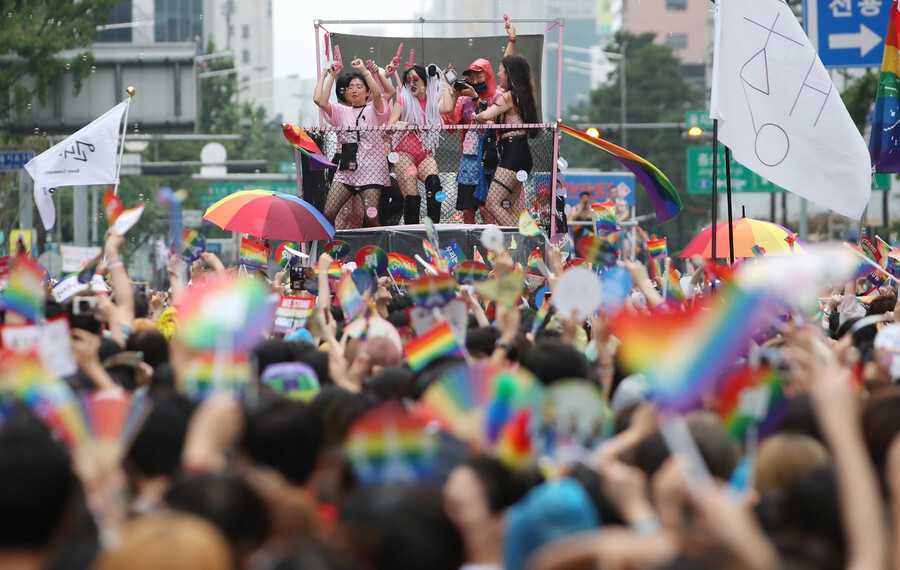hankyoreh
Links to other country sites 다른 나라 사이트 링크
More S. Koreans identify as conservative than in previous years

The percentage of South Koreans who consider themselves conservative increased considerably last year, accompanied by a corresponding decrease in those who regard themselves as progressive, a new study finds.
According to a fact-finding study about social integration that was released by the Korea Institute of Public Administration on Feb. 20, the percentage of respondents who identified themselves as having a conservative orientation rose from 21.2% in 2018 to 24.7% in 2019, up 3.5 percentage points. In contrast, the percentage of those who reported a progressive orientation was found to decrease from 31.4% to 28%, down 3.4 percentage points, during the same period. This reversed a trend of more self-identifying progressives and fewer self-identifying conservatives since the study was first held in 2013.
Changes in ideological orientation tracked a shift in attitudes toward minorities. Exclusionary attitudes toward social minorities — including homosexuals, North Korean defectors, and people with disabilities — increased sharply last year. In 2018, 49% of respondents were unwilling to tolerate homosexuals, but last year, that percentage increased to 57.1%. During the same period, the percentage of respondents who were unwilling to tolerate people born in North Korea more than doubled, from 12.6% to 25.5%. There was also a major jump in the percentage of respondents unwilling to tolerate people with disabilities, from 1.3% to 5.1%, over the same period.
National Assembly, prosecutors, courts, media, and police the least trusted institutionsWhen asked about which institutions they trusted the most, respondents chose hospitals, followed by schools, banks, local governments, and the military. The least trusted institution was the National Assembly, followed by the prosecutors, the courts, newspapers, and the police.
This survey was carried out by Hankook Research, a polling organization, on behalf of the Korea Institute of Public administration between September and October of last year. The poll surveyed 8,000 South Korean nationals, with a reliability of 95% and a ±1.84 point margin of error.
By Kim Kyu-won, staff reporter
Please direct comments or questions to [english@hani.co.kr]
Editorial・opinion
![[Editorial] Penalties for airing allegations against Korea’s first lady endanger free press [Editorial] Penalties for airing allegations against Korea’s first lady endanger free press](https://flexible.img.hani.co.kr/flexible/normal/500/300/imgdb/original/2024/0502/1817146398095106.jpg) [Editorial] Penalties for airing allegations against Korea’s first lady endanger free press
[Editorial] Penalties for airing allegations against Korea’s first lady endanger free press![[Editorial] Yoon must halt procurement of SM-3 interceptor missiles [Editorial] Yoon must halt procurement of SM-3 interceptor missiles](https://flexible.img.hani.co.kr/flexible/normal/500/300/imgdb/child/2024/0501/17145495551605_1717145495195344.jpg) [Editorial] Yoon must halt procurement of SM-3 interceptor missiles
[Editorial] Yoon must halt procurement of SM-3 interceptor missiles- [Guest essay] Maybe Korea’s rapid population decline is an opportunity, not a crisis
- [Column] Can Yoon steer diplomacy with Russia, China back on track?
- [Column] Season 2 of special prosecutor probe may be coming to Korea soon
- [Column] Park Geun-hye déjà vu in Yoon Suk-yeol
- [Editorial] New weight of N. Korea’s nuclear threats makes dialogue all the more urgent
- [Guest essay] The real reason Korea’s new right wants to dub Rhee a founding father
- [Column] ‘Choson’: Is it time we start referring to N. Korea in its own terms?
- [Editorial] Japan’s rewriting of history with Korea has gone too far
Most viewed articles
- 160% of young Koreans see no need to have kids after marriage
- 2Presidential office warns of veto in response to opposition passing special counsel probe act
- 3Months and months of overdue wages are pushing migrant workers in Korea into debt
- 4[Editorial] Penalties for airing allegations against Korea’s first lady endanger free press
- 5Japan says it’s not pressuring Naver to sell Line, but Korean insiders say otherwise
- 6S. Korea “monitoring developments” after report of secret Chinese police station in Seoul
- 7Hybe-Ador dispute shines light on pervasive issues behind K-pop’s tidy facade
- 8Inside the law for a special counsel probe over a Korean Marine’s death
- 9USFK sprayed defoliant from 1955 to 1995, new testimony suggests
- 101 in 5 unwed Korean women want child-free life, study shows